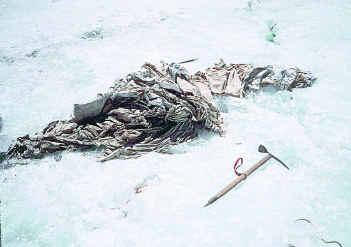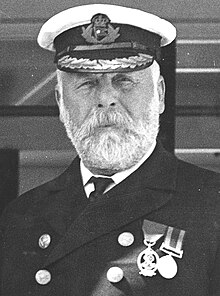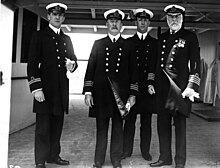For a while, Edmund Hillary and Tenzing Norgay were the only two persons to have set foot on the top of the world’s tallest peak. They did it on June 2, 1953, just before coronation of Queen Elizabeth II. The news electrified the world in a way we can hardly imagine today. The North Pole had been found, and the South Pole, and almost every other remote location in the world had been explored and conquered and claimed. British climbers had been trying to ascend Everest for at least 25 years before Hillary and Norgay, using bottled oxygen, finally succeeded.
Since then, there have been more than 615 successful ascents of Mount Everest– and 142 deaths. In 1996 alone, there were 30 expeditions, all up there during the same two-week period in May, the only safe– if you could call it that– time to climb Everest, between the winter snows and the spring typhoons.
So it’s not a very exclusive club any more. Nor is this club confined to extraordinary athletes: in 1985, climber David Breashears escorted a wealthy but fit 55-year-old Texan to the top, proving, so it seemed, that almost any reasonably healthy person could do it. Everest lost some of its lustre and soon serious mountain climbers were going after more exotic records, like “first person to climb the highest mountain on all seven continents” and “first person to climb a mountain on a bicycle” and “first person to actually camp on the summit”, and so on.
Every year now, dozens of climbers make the attempt, and a good number of them make it. It’s become big business, for the guides, for the Sherpas (12 or more required for each expedition), for the climbers (witness the glut of books and films), and for the governments of Nepal and Tibet, the two nations bordering on Everest. These governments charge up to $70,000 for permits for each expedition. Legitimate expenses? Right. Because the government has to cover some costs involved in these expeditions. Do they? So how come volunteers from around the world have to clean up the cast-off oxygen bottles and torn tents? Cash grab? Probably.
Still, it would be a mistake to underestimate the resolve, discipline, courage, and determination required to plant your foot on the highest spot on the planet. One out of five never come back.
It’s not as if you can just take a bus to the base of the mountain and then give it your best shot. The journey to “Base Camp” itself (at 17,500 feet, the starting point for all expeditions to the top) requires a flight to Katmandu, a ride in a battered, aging Soviet helicopter to the town of Lukla, 9,200 feet up, and then a long trek, usually about 3 or 4 days, through mountainous passes and wobbly foot-bridges over winding rivers. There are no Holiday Inns on this journey: you stay overnight in rambling, leaky stone lodges. You may pick up a dangerous parasite if you are not careful about what you eat and drink. And if you do get the runs, you’ll have to relieve yourself in an outhouse– if they’re not overflowing.
All of the supplies necessary for a summit attempt– food, water, oxygen bottles, medical equipment, and radios, and so on, must be laboriously hauled up narrow, winding mountain paths by yaks.
There is only about 1/2 as much oxygen in the air at base camp as there is at sea level. Above 25,000 feet, there is only 1/3 as much. Climbers must slowly acclimatize themselves to the thin air, a process than can take up to eight weeks, of grueling excursions up and down the lower ranges of the mountain.
The ascent begins with a harrowing trip through the Khumbu Icefall, a unstable white maze of fractured glacier and towering seracs that has taken more lives than any other part of the mountain, including the summit. In some places, climbers must walk across three or more rickety aluminum ladders strapped together over a crevasse hundreds of feet deep. The glacier itself moves 3 to 4 feet every day, and is covered with a thin layer of snow and ice that can conceal treacherous gaps.
After a few trial runs, you camp above the glacier in temperatures that can descend to -20 C. Then climbers ascend the Lhotse Face, a sheer icy wall of 3000 feet, and camp about halfway to the top of it, at 24,000 feet.
When someone says “mountain climber” to us, we tend to picture a blonde yodeling alpinist ascending a steep rock face with ropes and pick axe. Most of Everest, however, including the Lhotse Face, is more like a very steep walk. Most climbers attach themselves to ropes strung along the face for safety, but they basically walk up a very steep, hard, icy incline of about 30 degrees. It is the incredible cold, the wind, the snow and ice, and that thin oxygen that makes it so fearsome.
The tents are nestled into little ledges carved out of the ice by the Sherpas. The Sherpas don’t carve out ledges for themselves, though: they prefer to go on up to the South Col at the top of the Lhotse Face and camp where it’s safer.
The film version of “Into Thin Air” (a dramatization– not a documentary) shows Chen Yu-Nan, a Taiwanese climber, coming out of his tent on the Lhotse face clad only in his boot liners. He slips and falls down a hundred feet or so and then drops into a crevasse. In the film, he died then and there, but in real life, he died a few days later, while trying to make his way back to base camp. The Taiwanese team proceeded without him.
Above 20,000 feet, the adventurers travel very slowly, resting every few steps. Many climbers develop a hacking cough, dizziness, and insomnia. If you ascend too fast, you can develop altitude sickness– your body fails to produce enough red blood cells to keep your brain fed. This can also lead to High Altitude Cerebral Edema (HACE) or High Altitude Pulmonary Edema (HAPE). Blood vessels in the brain, starved for oxygen, swell up, causing disorientation, loss of motor functions, and even coma. Climbers lose weight quickly, making them more vulnerable to the cold.
As if that isn’t enough to deal with, the sun and snow combine to create unbearable heat and light during the day, giving climbers splitting headaches and dehydration. Once the sun has gone down, the temperature can drop to 20 or 30 below zero or worse. If you were to spend the night near the summit itself, you might encounter a wind-chill of well below -50. Few of the climbers who have been stranded near the top overnight in a blizzard live to tell the tale or make the talk show circuit.
Keep in mind that, even in this day and age of phenomenal technological breakthroughs, Everest remains one of the most remote places on earth. Helicopters cannot ascend higher than 20,000 feet (the air is too thin to provide thrust to the rotors), so there is no rescue possible for climbers trapped near the summit in a raging blizzard, other than the assistance of your depleted and exhausted fellow climbers.
Much of the current fascination with Everest can be traced to the media coverage of the disaster in 1996, when 12 climbers died over a three-day period. Writer Jon Krakauer was on one of those expeditions and wrote a searing, compelling book on it called “Into Thin Air”. This unusually honest and self-examining account of the many lapses in judgment that led to the disaster unleashed a storm of controversy that continues to simmer today.
Krakauer claims that some of the guides behaved irresponsibly, rushing ahead of their clients to the summit and then descending before their clients were safe. One of the key Sherpas wore himself out carrying 80 pounds of useless communications gear for writer Sandy Pittman so she could send “live” dispatches from the summit. Lines were not strung over the difficult Hillary Step until climbers had been waiting in the freezing cold for 90 minutes– a delay that may have cost several lives. It is clear that all of these problems were aggravated by the fact that there were 39 people trying to summit on the same morning. Bottlenecks formed. Climbers in difficulty were lost in the crowd. Guides lost track of who was where.
When a storm struck late in the day, two of the expedition leaders, Rob Hall from New Zeeland, and Scott Fisher from the U.S., were trapped on the mountain, along with several exhausted clients. Doug Hansen, a client with the Hall group and a postal worker from Washington State, disappeared and was never found. Andy Harris, a guide with Rob Hall’s group, probably slipped over one of the sheer cliff’s that surround the peak while trying to assist Hall. A group of climbers barely made it back to the South Col, the location of their advanced base camp, but couldn’t locate the tents in the howling wind and snow. They huddled in the cold growing weaker and weaker until ace climber Anatoli Boukreev (who had descended early, ahead of his charges) found them. Beck Weathers and Yasuko Namba (the oldest woman to ever summit Everest) were left for dead. The others were almost carried back to the camp.
The next day, to the utter astonishment of Krakauer and the others, Beck Weathers walked into camp under his own power. He was put into a tent and made as comfortable as possible, but it was expected that he would not last the night. The next day, he was found lying in the open– his tent had collapsed and torn away in the night and his sleeping bag was half off. He had been shouting for help for hours but nobody had been able to hear him. He ultimately lost his hand and nose to frostbite.
Ed Viesturs and David Breashears, who were waiting at the base camp to make their own summit bid, helped rescue Weathers, an action that became a bit of a sub-plot of the IMAX film. Viesturs and Breashears did a good thing, but the film plays coy with the facts. You are left with the impression that Beck Weathers got into trouble and Viesturs and Breashears heroically rescued him, and that was that. The IMAX film glosses over the rest of the disaster, partly because real disasters don’t sell very well, are complicated to explain, and raise questions about the whole idea of celebrating a summit of Everest.
A few days after Weathers was helicoptered to Katmandu from base camp, Viesturs, Breashears, a Spanish woman named Aracelli Segarra, and Jamling Norgay, the son of Tenseng Norgay, the first Sherpa to summit Everest, made their own successful summit.
The Viesturs team made a film of the trip for IMAX. It’s a big disappointment. For one thing, Viesturs got ahead of the team and reached the summit without benefit of cameraman. So what was supposed to be the climax of the film ends up being a verbal footnote. And when Segarra and Norgay make the top with the camera-man, you are left with the absurd impression that they filmed themselves. They celebrate, embrace, look out over the world, while the narrator trills their accomplishment… and you wonder who the heck is filming this, and why haven’t they said anything about him? How did he get there? Wasn’t that remarkable? Why are you pretending he isn’t there?
* * *
Many people don’t think much of the idea of climbing Everest. Why risk your life for an achievement that is completely symbolic, and of no scientific or humanitarian value whatsoever? Why should we feel sorry for climbers who die on Everest, when it is plain that their goals are entirely ego-centric?
The Viesturs expedition tried to patch a gloss of scientific necessity to the risk they took, much the way Robert Ballard tried to make his efforts to find the Titanic look useful and valuable, and NASA tried to make manned space missions seem necessary. But it is clear that there are really only two reasons people climb Everest. Firstly, to gratify one’s ego: I climbed Everest. Wow. Secondly, (and less dubiously), for the sense of personal accomplishment.
I have some respect for those who climb for the sense of personal accomplishment. It is still a remarkable achievement, of endurance, determination, and mental stamina. As I read through Krakauer’s book, I found myself experiencing an odd sense of longing for that bleak, windswept, arctic landscape near the top of Everest.
But I found that sense diminished when I considered that there would probably be another two dozen climbers up there at the same time.
Krakauer’s book is a powerful antidote to any illusions you might have about mountain climbing. It is a very rare little gem: an honest, intelligent book about sports– for that is what mountain-climbing really is– competition. Who got there first? Who did it the fastest? Who did it the most? Krakauer’s book has soul.





